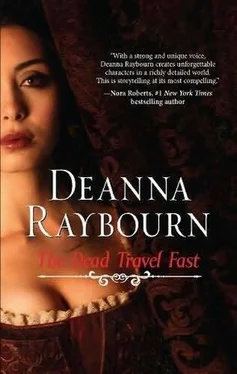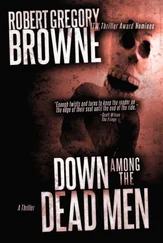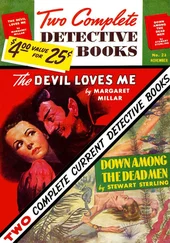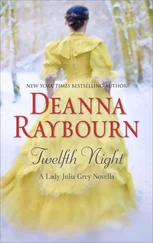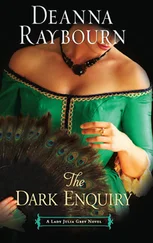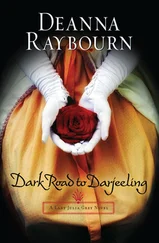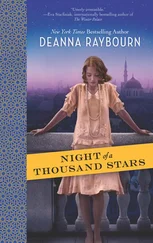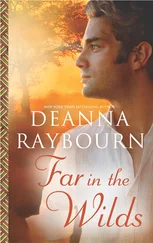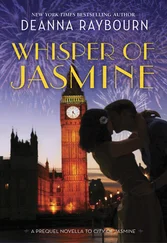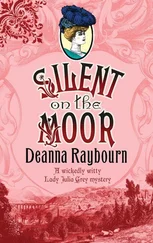Florian related what she said, murmuring hastily to me in German.
“‘I saw him,’ she says,” he told me. “‘I saw him there upon the observatory. I was making the windows fast as I do every night before I retire. I was at the window in the opposite wing, and I saw him perched upon the edge of the observatory walk. And then I saw him fly!’”
The countess let out a great sob, and Cosmina reached for the doorframe to steady herself. Dr. Frankopan spoke up.
“What do you mean, child? Count Andrei did not fly. He fell from the observatory and was fortunate enough to fall through the window. He might have plunged straight to his death in the valley had he not caught himself,” he said firmly. Tereza blinked at him and he repeated his argument in Roumanian.
But Tereza continued to utter the same phrases she had used before, and I had no need of Florian to know she would not be swayed.
“Child, he did not fly,” Dr. Frankopan said patiently, saying the words over and again in Roumanian and German. “He fell.”
“Or was pushed,” Frau Amsel said, her voice overloud in the quiet room.
There was a gasp, and I think pandemonium might have broken out were it not for the fact that Frau Amsel was pointing to a bit of fabric snagged upon the broken window. She walked over and plucked it free, but I did not need to look upon it to know what she brandished in her hand. Clutched in her triumphant hands was the tartan shawl I had left in the garden draped over a tarragon bush.
I did not feel it when the countess slapped me, for I had gone quite numb, and it was only distantly that I heard Charles remonstrate with her angrily. The room spun and jerked around me, faces swam before my eyes, and the only constant was my own voice, repeating over and over again, “But I love him.”
It was Charles who finally guided me away and took me to my chamber, and when we reached the room, he wrenched open the window and pushed my head outside, forcing me to drink in great draughts of the cold, crisp air until my head cleared. At last he drew me back in, and pressed a flask upon me.
“Good Scottish whisky,” he said firmly. I drank deeply of it, and the room cleared at last.
“I do not understand,” I said, my voice thin and feeble.
“Neither do I,” he told me, his expression grim. “But it is best to stay here quietly until someone comes.”
I did as he bade me, sitting upon my hands to stop them shaking and listening to the little clock tick off the hours. The night was half gone when there was a rap at the door and Dr. Frankopan entered, his cuffs folded back and smeared with blood. His blood, I thought wildly, and for an instant I was certain the doctor had come to tell me he had died.
“Is he dead?” I demanded.
Dr. Frankopan gave me an odd look. “Dead? Of course not. He suffered a dislocation of the shoulder and some rather severe cuts and bruises, but nothing he cannot overcome with rest and good care.”
I sagged into my chair, murmuring an Ave under my breath. If nothing else, the Carpathians would teach me religion, I thought wildly.
Dr. Frankopan drew a chair next to me and motioned for Charles to sit with us as well. “I have spoken to the countess, for it is she who rules during her son’s indisposition. She apologises for her outburst and begs you will understand a mother’s hysteria.”
“She does not think me responsible then?” I asked, dizzy with relief.
Dr. Frankopan’s response was carefully phrased. “She does not know what to think as yet. She wishes to make no decisions until her son has regained consciousness and can speak for himself as to what happened upon the observatory walk.”
“Tereza!” I said suddenly. “Tereza must have seen that I was not there when the count fell. She may absolve me.”
Dr. Frankopan shook his head sorrowfully. “Tereza saw nothing. I questioned her closely, and she saw nothing but the count.”
I lapsed back into my chair, feeling a thousand years old. “What am I to do until the count rouses and can clear my name?”
He shrugged. “It would be best for everyone if you were confined to your room. It would bring a greater ease to the family if you were not at liberty.”
“I am to be held prisoner until he wakes?” I asked, incredulous. It seemed impossible, and I looked to Charles to support me.
“I think it is for the best,” he said, to my astonishment.
“Charles! You cannot think that I-”
“Of course not,” he was quick to reply, using the same tone one might to soothe a fractious horse or a fretful babe. “But this is a necessary expedient. I must insist that Theodora not be locked in without visitors,” he said firmly to Dr. Frankopan. “She will receive regular visits from me, and writing materials and books besides. And anything else she should require for her comfort,” he finished.
“Naturally, naturally. The countess wishes her to think of herself as a guest still,” Dr. Frankopan said, his relief almost palpable. He had expected a fight then. But I had none left in me to give him, for all that mattered to me in that moment was that the count should live.
“Very well. I will sit quietly until I am bade to leave,” I promised.
Dr. Frankopan took his leave then with Charles, and after the door was shut, I heard the turn of the key in the lock, the loneliest, most frightening sound I had ever heard. I was a prisoner in the Castle Dragulescu.
Charles was the first to break in upon my solitude the next day when he carried in my breakfast. I had finally lapsed into sleep just before dawn, and it was very nearly noon before he roused me.
“You needed your rest,” he explained, when I scolded him for not waking me sooner.
“I know. And I know you are the only friend I have at present. Pay no mind to my churlishness. I do not mean it,” I finished helplessly.
He said nothing, but busied himself uncovering dishes and pouring out strong black coffee. The smell of it turned my stomach to water, but he had brought tea besides, and a cup of that with a nibbled bread roll comprised my breakfast.
“How is he this morning?” I asked finally. I had hesitated, both from the fear that he should have taken a turn for the worst, and out of the concern that speaking of him would grieve Charles. It is no easy thing for a man to measure himself against another and be found wanting.
But Charles was more a gentleman than I had credited him, for he brought me news of him and delivered it without resentment. “He does well enough, although he has not yet roused. Dr. Frankopan stays with him, and the countess comes and goes. Cosmina has been there as well, doing what she can. There is naught to do but wait until he wakes. His pulse is strong and his colour good, and although it was a shock of some magnitude to his mother to find that he is an opium-eater, Dr. Frankopan does not think the habit is of long enough standing to have damaged his constitution.” Charles hesitated, then took a breath and plunged on, speaking rather more hurriedly. “He murmurs a good deal in his sleep, and once or twice he has called your name.”
I finished my tea before I could master my tears enough to speak. “Thank you for that. It could not have been easy to tell me, but I am glad to know it.”
“Do not thank me. Half of them seem to think it proof of your guilt-as if he speaks your name to accuse you. Still, I know you are guiltless, and so will everyone else once he wakes.”
A sudden chill ran through me, stiffening my hand so that I nearly dropped the cup. “Charles, I am innocent, but someone else is not.”
“What do you mean?”
I replaced the cup carefully onto the saucer and rose to pace the room. “They think I pushed him, but we know I did not. What if he did not fall or fly of his own accord? What if he was pushed, but by someone else?”
Читать дальше
Конец ознакомительного отрывка
Купить книгу
